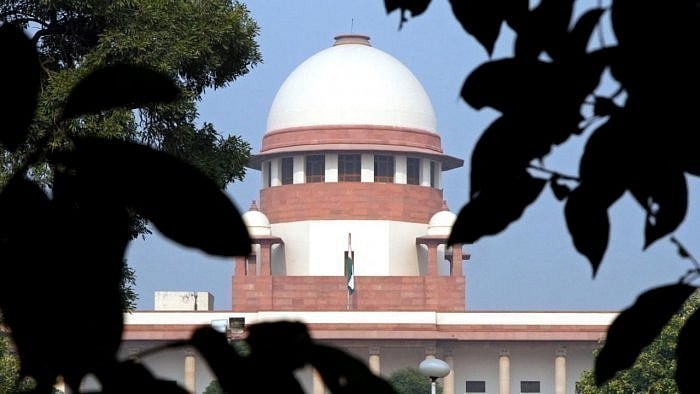
The Supreme Court of India.
Credit: PTI File Photo
New Delhi: The Supreme Court on Tuesday rejected a bail plea by a Delhi-based businessman held in the Rs 21,000 crore Mundra port drug haul case, which has been termed as the country’s biggest drug haul.
A bench of Justices Surya Kant and N Kotiswar Singh dismissed the plea, while granting liberty to accused Harpreet Singh Talwar alias Kabir Talwar to approach the court after six months for bail, saying, "We are conscious of the settled principle that pre-trial incarceration should not translate into punitive detention".
The court said that the allegation of terror financing against Talwar was premature.
"It would be premature and speculative to extend the allegations against the appellant to the domain of terror financing. While the prosecution has invoked provisions of the UAPA and has broadly linked the smuggling enterprise to trans-national syndicates with suspected affiliations, there is no compelling reason to currently link the appellant and proscribed terrorist organisations, either within or outside the country,” the bench said.
The investigating agency claimed that the proceeds of this sale for all these consignments, was to be used for funding terror activities of Lashkar-e-Taiba.
The bench, however, said the evidentiary foundation to sustain such a grave allegation must be clear and compelling—something that can be seen only after a substantial portion of evidence is led by both the parties.
The bench directed the special court to list the matter twice in a month for expeditious conclusion of trial in the case.
The court noted multiple key witnesses still remain to be examined, and the trial, while underway, will take time in completion.
The bench said this court also cannot ignore the fact that “Out of 24 most vulnerable or material witnesses, two have died, and two others are untraceable."
One of the deceased witnesses, a retired Customs Officer, was found dead on the very day he was scheduled to record his statement under Section 164 CrPC, the court noted.
"The risk of witness tampering or elimination—whether directly attributable to the appellant or not—is a real and present concern that militates against the grant of bail at this stage,” the bench said.
The bench said it is cognizant of the fact that no heroin or narcotic substances were directly recovered from the consignment linked to the Appellant.
“However, the investigative narrative does not rest solely on physical recovery but proceeds on the basis of conspiracy and facilitation. In such cases, the absence of direct seizure is not dispositive, particularly where there exists a pattern of covert coordination, fictitious entities, and barter-based compensation— features which, according to the prosecution, mark the smuggling architecture employed in the present matter,” it said.
The bench also said the NIA also highlighted that several accused remain absconding, including the primary foreign conspirators. In that context, the appellant’s foreign travel, overseas connections, and financial capacity cannot be overlooked in evaluating the possibility of flight risk. “These are not speculative concerns but flow directly from the appellant’s prior conduct and profile,” the court said.
While opposing Talwar’s bail, the NIA had argued that it was a test case of sending narco consignment (heroin) to India, disguised as legal imports in the form of semi-processed talc stones (a raw material having a wide range of applications).
"The said semi-processed talc stones were heroin laden stones, which were imported to India in the name of newly opened proprietor firms and shell companies, which showed these heroin laden semi-processed talc stones as a business commodity," the NIA said in an affidavit.
The present case was pointed out to be "largest intercepted consignment of narco-substance" being brought to India through illicit means.
The NIA’s counsel had called Talwar a habitual offender who was previously booked in several cases of smuggling, and there were apprehensions, if he is granted bail, that the witnesses could either be influenced or killed.
On September 12, 2021, some containers arrived at Mundra Port from Afghanistan via Iran, filled with bags full of semi-processed talc stones.
After checking the containers on September 13, 2021, the Directorate of Revenue Intelligence claimed some of the bags were found to contain heroin, eventually leading to the alleged recovery of 2988. 21 kilograms of heroin worth Rs 21,000 crore.
Investigators subsequently found that it was the sixth and last consignment which was intercepted. Several people, including Afghan nationals, were arrested in connection with the case.
